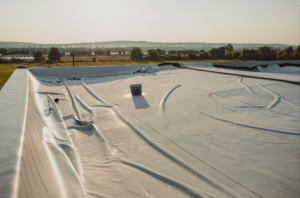RB Farina Roofing Co partners with leading manufacturers like GAF to offer top-quality products and expert installation for commercial and industrial roof replacement. Our specialty includes TPO and PVC single-ply roofing membranes.
What is TPO Roofing?
TPO and PVC are thermoplastic single-ply roofing membranes with heat-welded seams that save money on energy bills. Both are “cool” roofing materials and are installed similarly. PVC is more flexible and chemically resistant, while TPO is more affordable and has better thermal expansion properties.
More on TPO Roofing Materials
TPO is a roofing membrane that consists of a single layer, and it is becoming increasingly popular among commercial roofing products. These roofs are easy to install, durable, and versatile, which is why they are in high demand. Using TPO materials for roofing is a wise choice for business owners who want to save money.
TPO roofing membranes are available in 10, 12, or 20-foot sheets, and the appropriate width is selected by installers to reduce the number of seams on the roof. Fewer seams mean increased water resistance, and this is a strategy that contractors use to decrease the likelihood of leaks for your roof.
Additional advantages of TPO roofing are:
- Outstanding resistance to water
- A naturally reflective surface that deflects harmful UV rays and prevents damage to building components
- They consist of a single layer of synthetic materials and reinforcing scrim, which typically results in affordability
- You have the option to select the type of insulation to pair with TPO roofing materials
- TPO is Class A fire-rated, and fire retardant chemicals are added during manufacturing
How TPO Roofing Can Save You Money
TPO roofing, unlike EPDM black roofs, reflects UV rays and heat, reducing the need for indoor cooling and saving on energy costs. Furthermore, it is one of the most cost-effective roofing materials on the market.
TPO Roof System Installation
TPO roofing is an affordable and resilient membrane created for industrial and commercial single-ply systems. TPO is renowned for its:
- Cost-effectiveness
- Easy installation
- Energy efficiency
- Thermal expansion characteristics
TPO roof systems are a common choice due to their less labor-intensive installation process, which is another way building owners can reduce expenses.
Insulation on TPO Roofs
All roofing materials require some form of insulation. TPO roofs offer several insulation options, including:
- Polyisocyanurate (polyiso), the most commonly used insulation, has a higher R-value rating despite being more expensive.
- Expanded polystyrene (EPS), has the highest R-value per cost and is suitable for roofs, walls, and even floors. It is also water-resistant, making it ideal for commercial building owners.
- Extruded polystyrene (XPS), a semi-permeable insulation that comes in blue, green, or pink, and offers a balanced combination of price and performance.
What is R-Value?
R-value measures a material’s heat resistance, with a higher value indicating better insulation capabilities. When selecting commercial roofing materials, R-value is crucial since thicker insulation layers provide greater thermal resistance. If you need to insulate a building’s roof to maintain lower temperatures, opt for insulation with a high R-value and thickness.
Your commercial roofing contractor in Arlington MA will offer guidance on the appropriate R-value. The recommended R-values for attics, 2×4 walls, 2×6 walls, floors, and crawl spaces range from R-13 to R-60. Your commercial roofing contractor will advise you on the appropriate insulation with an R-value between R-30 and R-60 based on your building’s specific needs.
Schedule Your Commercial Roof Consultation Today – Book Now!
How Much Does TPO Roofing Cost?
TPO roofing expenses vary as every project is unique, with no fixed pricing structure. Typically, the cost ranges from $3.50 to $7.50 per square foot, including materials and labor. However, there is more flexibility on the higher end of the range. The following factors will influence the final cost:
- Roof size
- Existing roof condition
- New construction or complete roof replacement
- Roof accessibility for workers and material transportation
- Chosen insulation and membrane type
- Presence of roof penetrations (vents, chimneys, etc.)
- Warranty options are offered by the manufacturer or selected with roofing materials.
How Long Does a TPO Roof Last?
TPO roofing typically lasts between 15 and 20 years with regular maintenance. Promptly address any problems, such as seam separation, punctures, or faulty flashings, by contacting a professional. In the event of a leak, arrange for a roof inspection to pinpoint the source and remedy the issue. During an inspection, your expert will:
- Identify the leak location
- Inquire about the roof’s age
- Evaluate the number of roof layers
- Inspect the roof seams’ condition.


